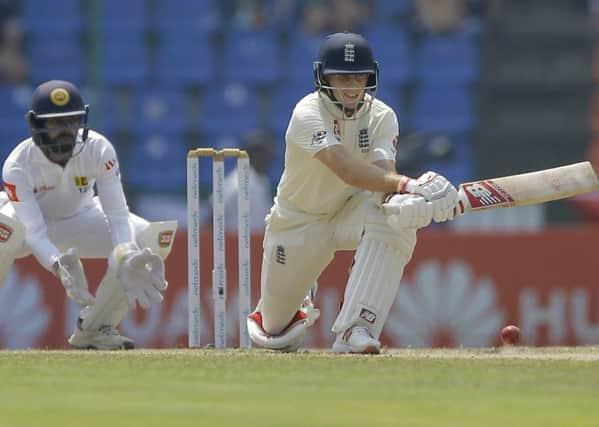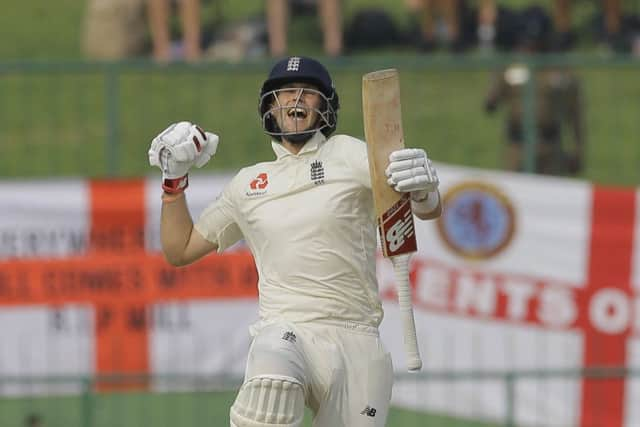Chris Waters '“ How the game has changed as England bid to sweep up the series


Not so long ago, batsmen succumbing in this manner – particularly to the reverse sweep, whereby a right-hander goes down on bended knee to effectively play the ball left-handed – were magnets to criticism; it was not the “done thing” to get out in that fashion.
Times change.
In 1987, Mike Gatting was famously lampooned when he got out to a reverse sweep in the World Cup final against Australia, a shot that effectively cost England the match.


Advertisement
Hide AdAdvertisement
Hide AdGatting’s men were cruising on 135-2 in reply to 253-5 when he was caught at the wicket reverse-sweeping Allan Border, Australia going on to win by seven runs.
Gatting is in Sri Lanka for the current Test series, hosting a group of England supporters.
As England reached 324-9 in their second innings on day three in Kandy, a lead of 278 after captain Joe Root struck a sublime 124, he told the BBC that he had never seen more sweep shots played in his life, with around 33 per cent of England’s runs coming from shots that are now part and parcel of the modern game.
Gatting, who quipped that in his day umpires would give you out simply for trying the sweep, praised England’s tactics against the turning ball.
Advertisement
Hide AdAdvertisement
Hide AdFor although batsmen fell to strokes once considered high-risk, those strokes also enabled England to score freely and establish a potentially match-winning position as they eye a 2-0 lead in the three-match series.
Should that happen, they will have Root to thank as much as anyone, the Yorkshireman’s 15th Test hundred – and fourth overseas – undoubtedly one of his finest innings.
If anyone epitomised England’s busy and selectively aggressive approach, it was Root, who was fleet of foot and worked scoring angles with great creativity.
The fact that there were only two maidens all day was indicative of England’s modus operandi, which ensured that Sri Lanka’s spinners were unable to dominate.
Advertisement
Hide AdAdvertisement
Hide AdThe best of them, Dananjaya, returned figures of 23-0-106-6, his best in Test cricket before he misses the final match to have his bowling action tested by the International Cricket Council.
The game was beautifully poised going into day three, with England trailing by 46 and yet to open their account in the second innings.
Jack Leach, the nightwatchman, fell early, but Rory Burns and Keaton Jennings added 73 to clear away the deficit and put the match situation back into the black from England’s perspective.
Burns, whose scores in Test cricket are steadily rising (9, 23, 43 and now 59), played splendidly before he was one of two batsmen to waste a review trying to overturn an lbw in the space of five balls. Ben Stokes was the other, England sliding to 109-4 – at that stage a fragile-looking lead of only 63.
Advertisement
Hide AdAdvertisement
Hide AdBut Jos Buttler added 74 with Root, who then lost Moeen Ali to an lbw decision that could have been overturned had England not blown their reviews (ditto Adil Rashid later in the innings when replays showed that he got an inside-edge).
Root found another ally in Ben Foakes, however, with whom he added 82 for the seventh-wicket, Foakes finishing the day unbeaten on 51.
Root, the last sweeping victim as he tried a Gatting-esque reverse, reached his century from 120 balls – his second-fastest in Tests – and faced 146 deliveries in total, striking 10 fours and two sixes.
What his innings meant to him could be ascertained from a celebration that included much fist-pumping and expressions of delight; what it may yet mean to his side, of course, could be even more significant.
It left England in the box-seat but not yet home and hosed.
Advertisement
Hide AdAdvertisement
Hide AdIn the first part of the game, Sri Lanka unexpectedly rallied to achieve a first innings lead, and opinion was divided as to whether England’s lead of 278 was already sufficient.
But if England prevail, their positive approach, and their willingness to play the sweep shot, will come to be seen as a decisive factor.
It is all a far cry from 1987, when Gatting played a shot once remembered with a shudder and a nudge to spend more time nose-deep in the MCC coaching manual.